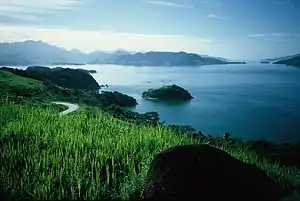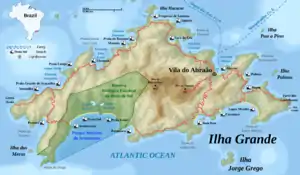Ilha Grande
Ilha Grande (Portuguese pronunciation: [ˈiʎɐ ˈɡɾɐ̃dʒi] "Big Island") is an island located off the coast of Rio de Janeiro state, Brazil. The island, which is part of the municipality of Angra dos Reis, remains largely undeveloped. For almost a century it was closed by the Brazilian government to free movement or settlement because it first housed a leper colony and then a top-security prison. Cândido Mendes high-security prison housed some of the most dangerous prisoners within the Brazilian penal system. It was closed in 1994. The largest village on the island is called Vila do Abraão with approximately 1900 inhabitants.
 View of Ilha Grande from the mainland | |
 English topographic map of Ilha Grande | |
| Geography | |
|---|---|
| Location | Atlantic Ocean |
| Coordinates | 23°09′S 44°14′W |
| Area | 193 km2 (75 sq mi) |
| Highest elevation | 1,031 m (3383 ft) |
| Highest point | Pico da Pedra D'Água |
| Administration | |
| Municipality | Angra dos Reis |
| State | Rio de Janeiro |
| Demographics | |
| Population | ~5000 (2014) |
| Official name | Paraty and Ilha Grande – Culture and Biodiversity |
| Criteria | Cultural and Natural: (v), (x) |
| Designated | 2019 (43rd session) |
| Reference no. | 1308 |
| State Party | |
| Region | Latin America and the Caribbean |
The island, which is 193 km2 (75 sq mi) in area, is now a popular tourist destination that is noted for its scenic beauty, unspoilt tropical beaches, luxuriant vegetation and rugged landscape. The highest point is the 1,031 m (3,383 ft) Pico da Pedra D'Água. Most of its territory is within the Ilha Grande State Park. The remainder of the island is subject to stringent development restrictions.
On 5 July 2019, Ilha Grande and Paraty were inscribed as a UNESCO World Heritage Site.[1]
Flora & fauna
The Ilha Grande is one of the most pristine remnants of Brazil's Atlantic rainforest making it one of the richest ecosystems in the world. As a hotspot for biodiversity and conservation, it holds some of the largest remaining populations of many endangered species, including the red-ruffed fruitcrow (Pyroderus scutatus), the brown howler monkey (Alouatta fusca), the maned sloth (Bradypus torquatus) the red-browed amazon parrot (Amazona rhodocorytha), and the broad-snouted caiman (Caiman latirostris). The seas around the island, which are also protected, feature a unique convergence of tropical, subtropical, and temperate-zone marine life, and may be the only waters in the world where it is possible to see corals and tropical fish including sharks[2] along with sea turtles, Magellanic penguins and cetaceans such as southern right,[3] humpback,[4] Bryde's,[5] orca,[6] and dolphins.[7]
The islands are contained within the 12,400 hectares (31,000 acres) Tamoios Environmental Protection Area (APA), created in 1982.[8] The island (and APA) contains the Aventureiro Sustainable Development Reserve, created in 2014 from the former Aventureiro Marine State Park, which was integrated with the Praia do Sul Biological Reserve.[9] 62.5% of the island is covered by the Ilha Grande State Park, making a total of 87% of the island protected.[10]
Tourism industry
Small-scale ecotourism is being encouraged on the island. Although it has no roads and motorised vehicles banned, the island has more than 150 km (93 mi) of hiking trails connecting all the coastal villages and hamlets. Lodgings have been made available near many of island's 100 unspoilt beaches. One of the most popular activities for visitors is to trek to Lopes Mendes beach, about a two-hour hike from Abraao. Travel companies are now offering sight-seeing trips to see the island's various beaches, mountains trails and waterfalls.
Most of the visitor facilities and the park headquarters are located at Vila do Abraão. The village may be reached from the mainland by local ferries and fast catamarans. On January 1, 2010 devastating mudslides killed at least 19 people on the island.[11]
Gallery
.jpg.webp) Chouette on the island
Chouette on the island.jpg.webp) Dolphin nearby the island
Dolphin nearby the island Sea turtle swims in the ocean
Sea turtle swims in the ocean
References
- "Five sites inscribed on UNESCO's World Heritage List". UNESOC. 2019-07-05. Retrieved 2019-07-05.
- Lins A.. 2011. Tubarão na Baía da Ilha Grande on YouTube. Retrieved on September 18, 2017
- Ilha Grande. Org. 2016. Baleias Jubartes na Ilha Grande - RJ. Retrieved on September 18, 2017
- Lourenço A.. 2010. Ilha Grande Baleia na enseada do Abraão video01 avi on YouTube. Retrieved on September 18, 2017
- Lodi L.. 2016. Baleia-de-bryde: Navegando com as gigantes. Blog ECONSERV – Ecologia, Conservação e Serviços. Retrieved on September 18, 2017
- Cruzeiro do Su (pt). 2015. Grupo de sete orcas é avistado em praia de Ubatuba. Retrieved on September 18, 2017
- Ilha Grande. Com. Ilustres visitantes. Retrieved on September 18, 2017
- APA de Tamoios (in Portuguese), INEA: Instituto Estadual do Ambiente, retrieved 2016-09-26
- PES Marinho do Aventureiro (in Portuguese), ISA: Instituto Socioambiental, retrieved 2016-09-23
- "Parque Estadual da Ilha Grande - Angra dos Reis - RJ", Ilhagrande.org (in Portuguese), retrieved 2016-09-23
- "Mudslide in Brazil resort kills at least 19 people". BBC NEWS. 2 January 2010.
External links
| Wikimedia Commons has media related to Ilha Grande. |
| Wikivoyage has a travel guide for Ilha Grande. |
- Prefeitura de Angra dos Reis (in Portuguese)
- Portal Turístico da Ilha Grande (in Portuguese)
- O Caldeirão do Diabo
- Ilha Grande Travel Guide in English

